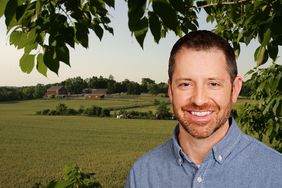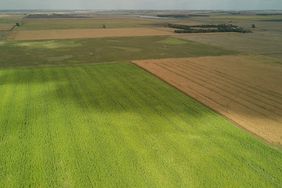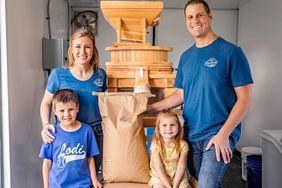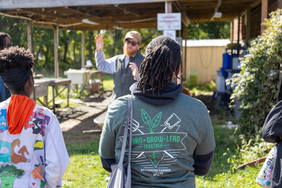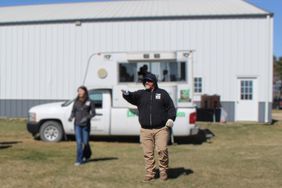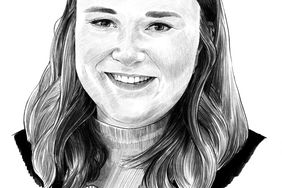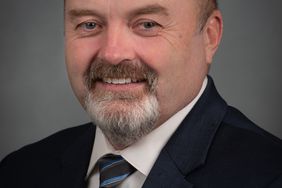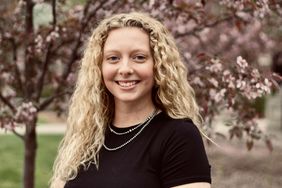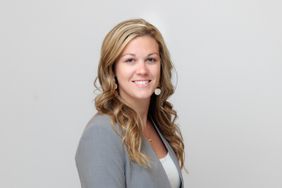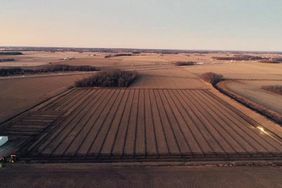:max_bytes(150000):strip_icc()/Heather20Beaner20hue-2-2000-42a5320131e540f0bbe597cc7d85c4ea.jpg)
The seemingly endless prairie and scarlet sunsets of northeastern South Dakota seemingly have little in common with the cosmopolitan cities, quaint villages, and military bases in Europe. Yet, Heather Beaner has made her mark in both worlds.
Beaner now farms near Mellette, South Dakota, having taken over from her father, Wayne Larson, in 2011.
Before that, though, she was a globe-trotting attorney in the U.S. Air Force (USAF) Judge Advocate General's (JAG) Corps. She did multiple tours at European and South Korean military bases before returning to USAF bases in San Antonio and Rapid City, South Dakota.
"I was one of the top 20 litigators in the Air Force for a couple of years," Beaner recalls. "I dealt with all felony-level cases — rape, sexual assault, child porn, drugs, aggravated assault."
These days, Beaner's legal background fits the farm, whether it's writing transfer deeds for land acquisition or spotting risk management issues.
:max_bytes(150000):strip_icc()/2904020Heather20Beaaner20Headshot-2-2000-e19a3dd31c0847ae82f4573ee34f397b.jpg)
"My military background was instrumental in teaching me how to organize a group of people to focus on a problem and to reach a solution," she says. "It's one that has served me well in various boards and organizations I have served on."
Here's the path Beaner took from her family's farm to the USAF JAG Corps and then back to the farm.
SF: How did you end up in the USAF JAG Corps?
HB: I grew up in the same house on the farm that I now live. My father farmed and had some businesses on the side. My maternal grandparents lived on the same farm, and my paternal grandparents lived a mile away. I did 4-H and a lot of different activities. I'd drive tractor every spring in a way that you wouldn't even dream of farming now, tilling up all the nice black dirt. We've now been no-till for 20 years, and don't even own a disk or field cultivator.
After I graduated from high school, I knew I was going to college, but I wasn't sure what I was going to do. I took two years of general requirements at Northern State [University] and then did a congressional internship. It was all constituent service, nothing political. I just thought it was really interesting. I noticed that everyone in government had law degrees, so I ended up going to law school. My mother once told me, "It's not surprising you ended up in law school because you like to argue and you like to talk."
I remember having a conversation with one of the third-year law students during my first year in law school about the movie A Few Good Men. He told me, "Yes, there really are military lawyers. You should go talk to the career counselor." So I did, and that's how I ended up in the JAG Corps.
SF: What's it like being a JAG attorney?
HB: It centers on the federal military criminal code, so it entails the same kinds of crimes that the federal government handles. Procedures are a little different because of the military nature.
JAG attorneys also handle legal assistance inquires, such as landlord or credit agency problems. They can't represent people in court, but they can give them referrals and help them understand their rights.
I had a passion for litigation. I had been a prosecutor and then went back to being a defense counsel for one year at a base in South Korea, but then went back to being a full-time prosecutor.
SF: What was your most memorable case?
HB: There was a college student who was raped by her designated driver when he took her home after she'd had too much to drink on her 21st birthday. He was an airman at the local base, and it took us a year to get through the prosecution, but we got a conviction and he received a good sentence. She gave me a little ceramic angel as a thank you. When I look at that, it reminds me to pray that she's moved on and found closure.
SF: Where were your stationed?
HB: I was blessed. My first assignment was in England at RAF Lakenheath. This was before 9/11, so I was able to easily travel to 30 different countries. I also served a year in South Korea and two years in Italy before taking an assignment in San Antonio and then Rapid City (South Dakota).
SF: Why did you come home to farm?
HB: I'd been on active duty 12 years. During the last couple of years, my mother's health declined significantly. She'd had a lung transplant and there was a time clock on her life. I wanted to spend more time with her.
I'd also met a guy when I was home on leave once, and he's a diehard South Dakota outdoorsman. I was not about to turn him into an Air Force spouse and drag into my next assignment to some cubicle in [Washington] D.C., so I switched to the Air Force Reserves and eventually retired in December 2019 as a lieutenant colonel. I came home, got married, and started my second career in life at 36 years old taking over the farm from my dad.
:max_bytes(150000):strip_icc()/2904020Heather20Beaner20work20clothes-2-2000-ea88f0e9b36f486eb17eeea7d1feff53.jpg)
SF: Did you always want to come back to the farm?
HB: When I grew up, daughters didn't take over farms. My dad ran the farm by himself with seasonal help, and when my mom's health went downhill, he needed to spend more time with her. Either we were going to have to sell or rent out the farm and dissolve the farm corporation. This was my opportunity.
SF: What was the transition from JAG Corps attorney to farmer like?
HB: When I came back, I wished I had an agronomy degree. I'd been away from the farm since the mid-1990s. This was before Roundup Ready [glyphosate-tolerant technology] and when we still had the disk and field cultivator and row cultivator.
When I came back, Dad had a computer in every cab, had all fields soil mapped, did precision application of fertilizer, and planted with variable-rate seeding. He also hadn't put any metal in the ground [via no-till] in 20 years.
I had to learn all of this from scratch. I had a bit of an advantage with technology because I've done a lot of that in the Air Force.
SF: What's been the biggest reward in farming?
HB: The opportunity to be a good steward to the land that God's given me. The average South Dakota farmer grows enough food every year to feed 155 people. By 2050, that needs to be closer to 200 people a year to account for the massive needs of the world's population growth. With that comes a responsibility to take care of my land, to be judicious with it as much as possible, and to grow as much as I can while remembering that land needs to last for my son and to the next generation. As farmers, we've been sustainability experts for centuries, but just in a different way than the public considers it.
SF: What is it like being a female farmer?
HB: Only 30% of the Air Force JAG Corps was female, so that was male dominated, too. Still, I came into a profession where for many years I was the only woman in the room. A long time ago, I stopped contemplating that. The guys who knew me growing up just took me in as Heather when I came back to the farm. New people who had moved in since would show up at the farm and ask to talk to my husband or father. I'd tell them that if you want to talk about the farm, you need to talk to me. I'm the farmer.
SF: What are your off-farm activities?
HB: A few years ago, I got to the point where I was able to operate the farm myself and was comfortable with my knowledge of farming. Still, I realized my education wasn't over, and that my service wasn't over. I'm the membership person for our local American Legion post and past president of the Legion Auxiliary unit. I serve in various positions at my church.
Other opportunities came up, such as serving on the South Dakota Soybean Research and Promotion Council board of directors, which is our state's checkoff board. I was also elected to the board of directors for Agtegra, (a farmer-owned cooperative).
SF: What changes have you make on the farm?
HB: Organic matter in our fields since going to no-till 20 years ago has gone from (percent content) 2s and 3s to 4s and 5s. However, we've had problems with high water tables from excessive rainfall. Now, the soils are tired, having sat under water all these years.
I have one field where the creek next to it is sloughing away (due to excessive precipitation). I planted grass strip to hold it. I've also had to put more land into CRP (Conservation Reserve Program) and even in areas without CRP, we've drilled grass mixes to deal with the high-water table.
We're on a straight corn and soybean rotation. That's hard on the ground. So, now, we're exploring alternatives to mix up the rotation, such as wheat or cover crops.
SF: What's been the biggest surprise since returning to the farm?
HB: The fact that there's not just one way to do something. There are multiple ways, and finding which way is right for you is difficult.
I've also had to get over the fact that I will make mistakes. One year, my fields will look great. I'll do the same thing the next year and they'll horrendous.
SF: Tell us about your family.
HB: My son, Gabe, is 7 and in love with Legos. My husband, Matt, is now home full-time farming after he retired from his job as president of a commercial general contractor firm. He always was around, and after he'd come home from work, I'd often ask him to help me with things. He grew up on a farm, but had never done in-depth technical tasks such as planting or spraying. It took me a couple of years to learn myself, so this summer I was training him to do those types of things.
:max_bytes(150000):strip_icc()/2904020Heather20Beaner20with20family-2-76b38a12dd324d49b527bd6eb68e8309.png)
SF: What are you doing this month?
HB: I have an annual meeting and board of directors meeting for Agtegra. I also have a meeting in St. Louis for the North Central Soybean Research Program for which I'm on the board of directors. Normally, I narrate the Aberdeen [South Dakota] Living Christmas Tree Performance, but it's been canceled a second year due to COVID-19. I believe celebrating the birth of Jesus is important, and it's a great time of year for family.
I also really enjoy teaching. I will likely be doing more substitute teaching at our local public school. I've also taught criminal justice and American government and history at Northern State University and Presentation College.
